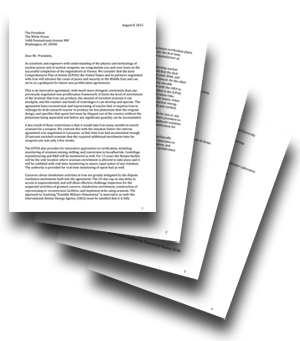There's been a lot of political noise about Iran's nuclear deal from both critics and supporters of President Obama's signature foreign policy initiative.
 Opponents of the agreement say it will not stop a determined Iran from developing a weapon, dealing a security blow to the West and presenting an existential threat to the State of Israel.
Opponents of the agreement say it will not stop a determined Iran from developing a weapon, dealing a security blow to the West and presenting an existential threat to the State of Israel.
Supporters of the pact argue it will prevent Iran's development of a bomb for at least a decade and trigger closer economic and political Iranian ties with the West as a new generation takes over from the country's current hard-core religious leadership.
The debate, in some ways, is similar to the heated argument over global warming, where emotions for and against run high, despite the view of 97 percent of scientists who say warming is a threat to mankind. Facts are hard for some to deal with.
A group of the world's 29 top scientists including five Nobel laureates on Aug. 8 weighed in on the Iranian nuclear deal.
In a letter to President Obama, they praised the deal as "innovative" and "stringent."
They said the pact "will advance the cause of peace and security in the Middle East and can serve as a guidepost for future nonproliferation agreements."
The group hailed as "unprecedented" the 24-day cap on Iranian delays to site inspections.
The two-page letter also warns opponents of the nuclear pact that before negotiations with Iran began, the country was "only a few weeks away" from developing fuel for weapons. It's a safe bet that development efforts would resume in the event the nuclear deal collapses. War and chaos would follow.
Heavy thinkers such as Siegfried Hecker, former director of the Los Alamos weapons laboratory; Rush Holt, former Congressman and current chief of the American Assn. for the Advancement of Science, the world's largest scientific society; and Richard Garwin, who helped develop the first hydrogen bomb, are among the signatories of the letter to Obama.
The scientists slice through the emotions and politics surrounding the nuclear deal in Washington.
In their educated opinion, the scientists believe Obama's deal is good for world peace and stability. They have a powerful argument.
The scientists live in what former Defense Secretary Donald Rumsfeld called "the reality-based world." Opponents' push for a "better deal" is nothing but diversionary hot air.


 The ridiculously high prices Americans are paying at the supermarket might influence how—or if—they vote in November.
The ridiculously high prices Americans are paying at the supermarket might influence how—or if—they vote in November. At a moment in history when there are so many conflicts among peoples here and abroad, let us put our differences aside and celebrate this wonderful season in a spirit of togetherness.
At a moment in history when there are so many conflicts among peoples here and abroad, let us put our differences aside and celebrate this wonderful season in a spirit of togetherness. The news announcing the death of Henry Kissinger, the last of the prevaricating politicians and so-called statesmen who stole my future and that of thousands of other young Americans, got me thinking about Walter Cronkite.
The news announcing the death of Henry Kissinger, the last of the prevaricating politicians and so-called statesmen who stole my future and that of thousands of other young Americans, got me thinking about Walter Cronkite.


 Have a comment? Send it to
Have a comment? Send it to 
No comments have been submitted for this story yet.